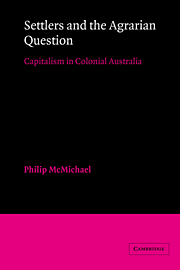Book contents
- Frontmatter
- Contents
- List of tables
- Preface
- 1 The social structure of British hegemony
- PART I THE COLONIAL ECONOMY ENTERS THE WORLD MARKET (1788–1830)
- 2 The transition from penal to commercial colony
- 3 The world-economic origins of colonial wool growing
- PART II THE SQUATTING PHASE OF PASTORALISM (1830s AND 1840s)
- PART III CONFRONTING THE AGRARIAN QUESTION (1840–1900)
- APPENDIXES
- References
- Index
3 - The world-economic origins of colonial wool growing
Published online by Cambridge University Press: 18 December 2009
- Frontmatter
- Contents
- List of tables
- Preface
- 1 The social structure of British hegemony
- PART I THE COLONIAL ECONOMY ENTERS THE WORLD MARKET (1788–1830)
- 2 The transition from penal to commercial colony
- 3 The world-economic origins of colonial wool growing
- PART II THE SQUATTING PHASE OF PASTORALISM (1830s AND 1840s)
- PART III CONFRONTING THE AGRARIAN QUESTION (1840–1900)
- APPENDIXES
- References
- Index
Summary
INTRODUCTION
In Chapter 2 I discussed how a potential imperial division of labor resulted from the coincidence of events and processes in Australia and Britain. This development marked the beginnings of the integration of the settler economy into the world market. Integration implied development of the settler economy to establish a productive social base for the wool-growing industry and a growing correspondence between the needs of the British textile industry and the colonial staple product.
The forging of the imperial division of labor involved the careful breeding of flocks to produce the fine wool that eventually secured colonial entry into world wool markets in the 1820s. Pioneering colonial wool growing for the world market required a special type of entrepreneur with sufficient capital to finance such a highly speculative undertaking. The pastoralist marketed his own wool clip. The distance of the Antipodes from London necessitated a long period of circulation (up to two years) for the wool to be shipped to England and the income on wool sales realized there (Blainey 1971, p. 127). The pioneer wool growers thus engaged in alternative enterprise to underwrite, and indeed facilitate, their wool growing activities. They were not merely large landed capitalists, then, but also traders with mercantile contracts in London.
In the absence of specialized wool marketing and hence commercial credit arrangements, early colonial wool growing was exclusively for wealthy landowners. These pioneers combined all phases of the circuit of pastoral capital – from putting up the initial finances, to producing the wool, to marketing the commodity in London, and finally through maintaining operations during the remittance of sales revenue.
- Type
- Chapter
- Information
- Settlers and the Agrarian QuestionCapitalism in Colonial Australia, pp. 54 - 76Publisher: Cambridge University PressPrint publication year: 1984



